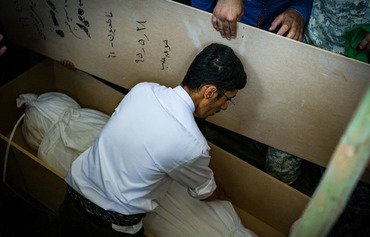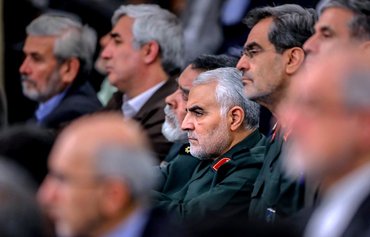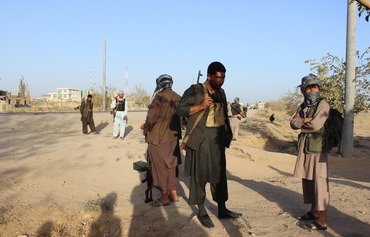Should Iran pursue a path to military conflict, the dire domestic situation it faces will only worsen, observers warned, noting that war would tip Iran further into economic collapse and trigger a regional refugee crisis of staggering proportions.
Iran is in dire straits, with skyrocketing inflation and plummeting currency reserves leaving it close to economic collapse. Strapped with sanctions, it is isolated in the international arena, while domestic discontent is on the rise.
Despite its extreme vulnerability, Iran persists in its campaign of sabre rattling with the United States, primarily through its proxies in Iraq. Iran-linked Iraqi factions have been blamed for a string of attacks against international anti-ISIS coalition forces in recent months -- at least 39 since January.
Iranians have been leaving the country in a steady stream since the Islamic Revolution of 1979, in search of more personal and political freedoms, a more stable financial situation, and better education and employment opportunities.
![Afghan migrants receive residency cards in Iran in 2019. [Khabaronline.ir]](/cnmi_di/images/2021/06/07/30209-Iran-Afghan-migrants-600_384.jpg)
Afghan migrants receive residency cards in Iran in 2019. [Khabaronline.ir]
![Migrants from Iran walk along the Greek-Turkish border in the village of Sofiko, Greece, on March 2, 2020. [Sakis Mitrolidis/AFP]](/cnmi_di/images/2021/06/07/30210-Iran-refugees-Greece-600_384.jpg)
Migrants from Iran walk along the Greek-Turkish border in the village of Sofiko, Greece, on March 2, 2020. [Sakis Mitrolidis/AFP]
Many head for the West, while Turkey provides a regional refuge for others.
A new Iranian conflict would see these numbers surge, observers say.
While the exodus of Iranians would be expected to spike in the event of a war, of even greater concern is the plight of the refugees Iran is currently hosting and the potential for a regional refugee crisis.
Refugees residing in Iran
According to the latest published data, Iran ranks seventh among countries hosting the highest number of refugees in the world.
A large number of Pakistanis have sought refuge in Iran, and Iranian government data show that as of October 2020, over 20,000 Iraqi refugees were living there. But the vast majority of refugees are Afghans.
Afghan refugees have fled to Iran in large numbers over the past three decades, with the rate of immigration steadily increasing in the last 10 years.
Some Afghans living in Iran have residency cards, a large number are undocumented, and others are there on visas.
The Iranian Foreign Ministry has typically issued three-month visas for Afghan immigrants, but recently has increased that to year-long visas.
Visa holders are meant to leave the country before the visa expires and apply for a renewal upon reentry. But many Afghans do not do that and continue to live and work in Iran illegally.
United Nations High Commissioner for Refugees (UNHCR) data show that over 3 million Afghans were living in Iran as of December 2020.
According to the UNHCR, some 951,000 Afghans living in Iran hold residency cards. Another 450,000 Afghans hold legal passports and need to extend their visas every three months.
Meanwhile, Iran hosts some 2 million undocumented Afghans.
In the event that Iran embroils itself in a conflict, many of these refugees would likely flee, creating a regional crisis, as their countries of origin may be unable to handle their return, observers say.
Effects of a potential conflict
Kabul-based international relations specialist Latif Nazari said Afghanistan's economy and trade would be severely affected if Iran goes to war.
A war would be "catastrophic" for the region, especially for Afghanistan, he said, noting that the influx of millions of Afghans fleeing Iran would create "a pervasive humanitarian and social crisis".
"Afghans who were forced to migrate due to war and misery in their country will be forced to return to Afghanistan, but the situation is not ready for them to safely return," said Kabul-based political affairs analyst Maqsood Hasanzada.
A mass return would likely "cause a humanitarian crisis in the country", he said.
Indeed, the Afghan government would not be able to provide returnees with jobs or shelter, said Sayed Masoud, a political and economic analyst in Kabul.
"Regional countries also are not in a position to accommodate millions of Afghan refugees in case of a war with Iran," he said.
Growing instability in Iran
Inside Iran, public rage over economic and living conditions has reached a boiling point, and observers warn the next round of protests might be more violent than the November 2019 protests over the spike in fuel prices.
Security forces led by the Islamic Revolutionary Guard Corps (IRGC) -- which receives the staunch support of supreme leader Ali Khamenei -- responded to those protests by shooting demonstrators in several cities, and detaining and torturing hundreds.
Some estimates suggest as many as 1,500 civilians were killed.
Reports from Iran in recent months of slowed-down internet speeds and intermittent outages suggest the regime may be trying to tamp down a new round of civil unrest.
On June 1, Iranian communications minister Mohammad-Javad Jahromi said the country's Supreme Security Council "may consider a social media blackout".
In one of the latest sign of unrest, Iranian security forces in February opened fire on civilians transporting fuel near the Pakistani border, triggering a violent uprising.
Yet despite the economic hardships in Iran and signs of brewing unrest, its leaders have chosen to continue spending their dwindling supply of cash on weapons they share with proxy militias in the region.
Should Iran's leaders pursue a path towards further aggression and embroil the country in conflict, observers warned, this would aggravate an already challenging situation and trigger massive regional repercussions.
[Sulaiman contributed to this report from Kabul.]

![Afghan men gather at the Shahid Nasseri refugee camp in Taraz Nahid village near the city of Saveh, some 130km southwest of Tehran, on February 8, 2015. Some 5,000 Afghan refugees live at the camp. [Behrouz Mehri/AFP]](/cnmi_di/images/2021/06/07/30208-iran-afghan-refugees-600_384.jpg)






